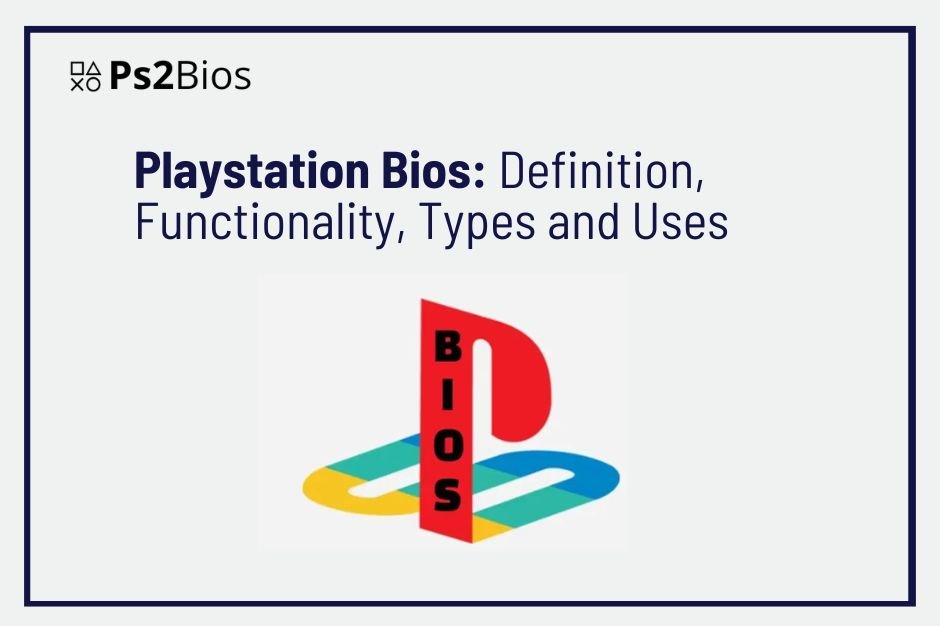The PlayStation BIOS (Basic Input/Output System) is a fundamental component in the PlayStation console’s operation, responsible for initializing the system’s hardware and enabling communication between the software and hardware. It is the firmware that allows the PlayStation to boot and perform necessary system functions, ensuring a seamless gaming experience by handling tasks such as hardware initialization, memory management, and game compatibility. The BIOS is integral to both physical consoles and emulation platforms, offering a bridge between the user and the hardware, making it a crucial element in the overall PlayStation ecosystem.
In this article, we will explore the definition of PlayStation BIOS, delving deeper into what it is and why it is essential for PlayStation systems. We will then discuss its functionality, providing insights into how it operates within the system and supports different gaming experiences. Next, we will cover the various types of PlayStation BIOS, including the most suitable versions for different platforms such as PC, Android, and MacBook. We will also look at the different versions of PlayStation BIOS tailored for various regions such as the USA, Japan, Europe, and China. Furthermore, we will discuss the uses of PlayStation BIOS, highlighting its versatility in both physical and emulated environments. To wrap up, we will guide you on how to download, install, and troubleshoot common issues related to PlayStation BIOS, ensuring that your system operates smoothly.
Each section will expand on these key concepts, providing you with a thorough understanding of the PlayStation BIOS, its significance, and its role in delivering a top-notch gaming experience.
What is PlayStation BIOS?
The PlayStation BIOS (Basic Input/Output System) is the firmware responsible for initializing the hardware and ensuring the smooth operation of the PlayStation console during startup. It provides the necessary low-level control over the system’s hardware, enabling the PlayStation console to boot up and function correctly. The BIOS acts as a mediator between the hardware and the software, allowing games and other software to communicate effectively with the system’s components.
Why PlayStation BIOS is Important?
The PlayStation BIOS is crucial for the proper functioning of the console as it contains the essential instructions for starting the system, managing the hardware, and performing diagnostics. Without it, the PlayStation console would not be able to run games or other applications. Additionally, the BIOS serves as a security feature, ensuring that unauthorized software cannot run on the system. It is the backbone that keeps the console running smoothly, providing support for various features such as the user interface and compatibility with external devices.
What is the Functionality of PlayStation BIOS?
The functionality of PlayStation BIOS extends beyond simply booting up the system. It plays a vital role in controlling the interaction between the hardware and software. The BIOS handles the hardware initialization, memory management, peripheral device interaction (e.g., controllers, storage devices), and executing the PlayStation operating system. It also provides the necessary infrastructure for loading games by facilitating the reading of the game disk or ROM files. Furthermore, the BIOS ensures that the system can detect and resolve any hardware issues that may arise, maintaining stability throughout its use.
What are Different Types of PlayStation BIOS?
There are various types of PlayStation BIOS designed for different PlayStation console models. These BIOS files are not interchangeable and must match the specific PlayStation version they are intended for. The main types include the original PlayStation BIOS, PlayStation 2 BIOS, PlayStation 3 BIOS, PlayStation 4 BIOS, and PlayStation 5 BIOS. Each type has unique functionalities and features, optimized for the respective hardware and software environment of the console.
Which PlayStation BIOS are Suitable for PCs?
For emulation purposes, PlayStation BIOS files for PC are necessary for running PlayStation games on a computer through emulators. The most commonly used BIOS for PC emulation is the PlayStation 1 (PS1) BIOS, which is typically used with emulators like ePSXe and PCSX-Reloaded. Similarly, PlayStation 2 (PS2) BIOS is required for PS2 emulators like PCSX2 to run PS2 games on a PC. However, to ensure legal compliance, these BIOS files should only be obtained from the console you own.
Which PlayStation BIOS are Suitable for Android?
When running PlayStation games on Android devices, the necessary BIOS files depend on the emulator being used. For instance, FPse is one of the most popular PlayStation emulators for Android that requires the PlayStation 1 (PS1) BIOS. Play! Emulator for PlayStation 2 requires the PS2 BIOS, while ePSXe is another well-known PS1 emulator for Android. As with PC emulation, the BIOS files should be sourced from the PlayStation hardware you legally own to avoid piracy.
Which PlayStation BIOS are Suitable for MacBook?
For PlayStation emulation on MacBooks, similar to Android and PC, the correct BIOS file is needed for the emulator to function. PlayStation 1 and PlayStation 2 BIOS files are used with emulators like PCSX for PS1 and PCSX2 for PS2. These emulators are available for Mac OS and work similarly to their PC counterparts, offering a means to play PlayStation games on Mac devices. The same legal precautions apply for sourcing the BIOS files.
What are Different Versions of PlayStation BIOS?
Different versions of PlayStation BIOS are released based on regions and console generations. Each version has specific characteristics that distinguish it from others, such as language support, region-locking mechanisms, and game compatibility.
PS BIOS USA
The PS BIOS USA is tailored for the North American region. It has specific features, such as supporting English language and game region coding specific to the USA. The BIOS for the USA PlayStation models is optimized for the NTSC format, which is the video standard used in North America.
PS BIOS Japan
The PS BIOS Japan version is designed specifically for the Japanese market. It supports the Japanese language and regional restrictions for games sold in Japan. The BIOS is configured for the NTSC-J video standard, which is the Japanese video format.
PS BIOS Europe
The PS BIOS Europe caters to the European market, supporting multiple languages such as English, French, and German. It works with the PAL video standard, which is commonly used in European countries, providing compatibility with games and media formats suited for the region.
PS BIOS China
The PS BIOS China is adapted for the Chinese market. It is optimized for the region’s game preferences, language, and regulatory requirements. Like other regional versions, it uses the appropriate video standards and handles specific compatibility issues for games and applications distributed in China.
What are the Uses of PlayStation BIOS?
The uses of PlayStation BIOS extend beyond simply initializing hardware. The BIOS is essential for game compatibility, system stability, and security. It enables various PlayStation consoles to run both official and homebrew applications. Additionally, it allows emulators to mimic the behavior of the original console, ensuring that games can be played on different platforms. The BIOS is also critical for updating and maintaining the health of the console, offering software patches and firmware updates that ensure long-term functionality.
How to Download PlayStation BIOS?
Downloading the PlayStation BIOS is a process that requires legal consideration. Since BIOS files are considered copyrighted material, they should only be obtained through legal means, such as extracting them from your own PlayStation console. Websites offering PlayStation BIOS downloads may not always be legal, and downloading from unofficial sources can expose you to the risk of malware or pirated content.
Where to Download the PlayStation BIOS Files?
The PlayStation BIOS files should ideally be obtained directly from your console to avoid legal issues. Many emulators allow you to extract the BIOS file from a PlayStation console. For instance, programs like PSX BIOS Extractor allow users to extract BIOS files from their PlayStation consoles. It is important to note that downloading the BIOS from unauthorized sources is considered illegal and violates copyright laws.
How to Install the PlayStation BIOS?
The installation process for the PlayStation BIOS typically involves placing the BIOS file into a specified folder within the emulator’s directory. For instance, in the PCSX2 emulator, you need to place the PS2 BIOS file into the BIOS folder within the emulator’s installation directory. After placing the file, the emulator should automatically recognize it when launched, allowing you to configure and run games. Be sure to follow the specific installation instructions provided by the emulator to ensure the correct setup.
What are the Common Errors Which Occur While Installing PlayStation BIOS?
Common errors during BIOS installation can include issues such as incompatible BIOS files, incorrect file placement, or missing dependencies in the emulator. For example, if the BIOS file is placed in the wrong folder or is of the incorrect version for the emulator, the system may fail to launch. Additionally, some emulators may display an error message stating that the BIOS file is missing or corrupted. Troubleshooting these errors often involves ensuring that the correct version of the BIOS is used and that it is properly placed in the correct directory.


